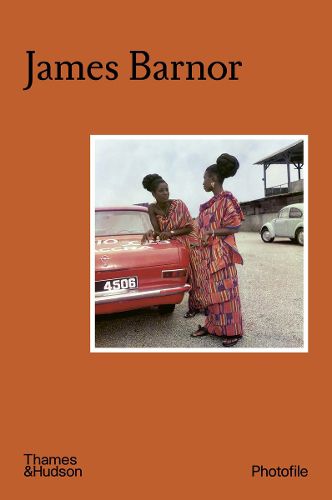Readings Newsletter
Become a Readings Member to make your shopping experience even easier.
Sign in or sign up for free!
You’re not far away from qualifying for FREE standard shipping within Australia
You’ve qualified for FREE standard shipping within Australia
The cart is loading…






A concise survey of the pioneering work of London-based Ghanaian photographer James Barnor.
With a practice spanning six decades and two continents, ranging from street to studio and fashion to documentary, Ghanaian photographer James Barnor (b.1929) is now recognised as a pivotal figure in the history of photography. Moving between Accra and London throughout his life, Barnor's photographic portraits visibly map societies in transition: Ghana winning independence from Britain, and London embracing the freedoms of the swinging sixties. He has said: 'I was lucky to be alive when things were happening ... when Ghana was going to be independent and Ghana became independent, and when I came to England the Beatles were around. Things were happening in the sixties, so I call myself Lucky Jim.'
Barnor's photographs have been described as 'slices of history, documenting race and modernity in the post-colonial world', and he has been the subject of several major retrospectives over the last fifteen years. This concise survey in the Photofile series is the perfect overview of his multifaceted work.
$9.00 standard shipping within Australia
FREE standard shipping within Australia for orders over $100.00
Express & International shipping calculated at checkout
A concise survey of the pioneering work of London-based Ghanaian photographer James Barnor.
With a practice spanning six decades and two continents, ranging from street to studio and fashion to documentary, Ghanaian photographer James Barnor (b.1929) is now recognised as a pivotal figure in the history of photography. Moving between Accra and London throughout his life, Barnor's photographic portraits visibly map societies in transition: Ghana winning independence from Britain, and London embracing the freedoms of the swinging sixties. He has said: 'I was lucky to be alive when things were happening ... when Ghana was going to be independent and Ghana became independent, and when I came to England the Beatles were around. Things were happening in the sixties, so I call myself Lucky Jim.'
Barnor's photographs have been described as 'slices of history, documenting race and modernity in the post-colonial world', and he has been the subject of several major retrospectives over the last fifteen years. This concise survey in the Photofile series is the perfect overview of his multifaceted work.